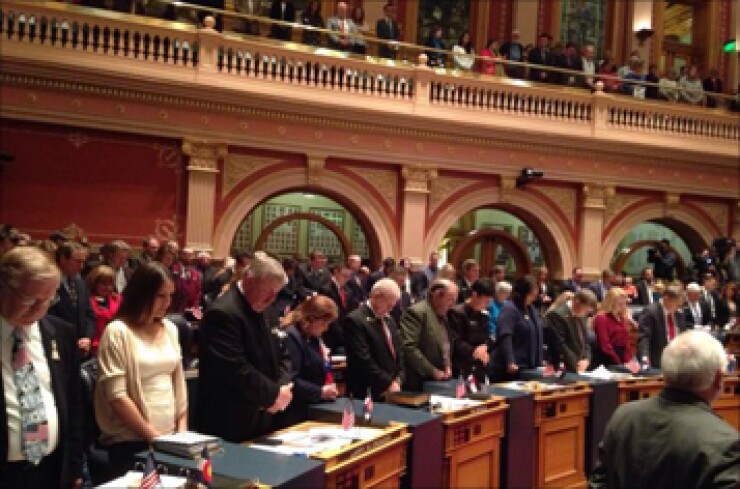
DALLAS — The Colorado General Assembly has about $1.05 billion more revenue to apply to the state budget this year, but the fact that its two houses are controlled by different parties is likely to complicate the process.
"We are about to face one of the best problems we have had in this legislature in a long time," Senate President Bill Cadman, R-Colorado Springs said in his opening speech Jan. 7. "It's called prosperity."
Cadman leads the Republican-controlled Senate, while House Speaker Dickey Lee Hullinghorst, D-Gunbarrel, leads the Democratic-controlled House. She is the second woman in the state's history to hold the gavel.
"There are those who say a split legislature will place many challenges in our path," Hullinghorst said in her opening remarks. "I prefer to regard these as opportunities to work together for all of our constituents."
Gov. John Hickenlooper, a Democrat, will retain veto power after winning a close election against Republican challenger Bob Beauprez on Nov. 4.
Hickenlooper takes the oath for his second term Jan. 13 and is scheduled to deliver his state of the state address on Jan. 15.
On Jan. 11, Hickenlooper named Doug Friednash, a public-sector attorney and partner with the firm Brownstein Hyatt Farber Schreck, as his chief of staff. Friednash aided Hickenlooper's campaign for re-election and is expected to help him deal with contentious issues over oil and gas drilling, new regulations of the state's legal marijuana market, restrictions on firearms and other issues.
The hard-fought governor's campaign left Hickenlooper with a divided legislature after Republicans gained control of the Senate.
While Senate Republicans are calling for reducing taxes and regulatory barriers to business, Democrats are talking about mending economic safety nets and providing more funds for public education.
"Our middle class Colorado families are standing uncomfortably close to the edge of the cliff," Hullinghorst said in her opening remarks. "Only one emergency away from sliding right back to where we were in the depths of the Great Recession."
Republicans are expected to target renewable-energy mandates passed by Democrats in recent years. One proposal would reduce higher renewable energy requirements for rural electricity providers, a law that Democrats passed two years ago.
"Rolling back costly, useless regulations will make us more competitive," Cadman said. "And if we are not sharpening our competitive edge in every place we can, we are losing it in every place we don't."
According to the Colorado Legislative Staff's forecast, lawmakers will see a general fund increase of $1.05 billion or 11.3% for the fiscal year beginning July 1, compared to the current fiscal year ending June 30.
The forecast issued Dec. 22 is more optimistic by about $89.7 million compared to the one provided in September.
Limitations on how much revenue the state can keep come from the Taxpayer Bill of Rights, or TABOR, amendment.
The General Assembly will need to set aside $120.3 million in fiscal year 2015-16 to be refunded to taxpayers per TABOR, the report noted.
"As a result, the earned income tax credit and a sales tax refund estimated at $10 per taxpayer will be available during income tax year 2016," the report said.





